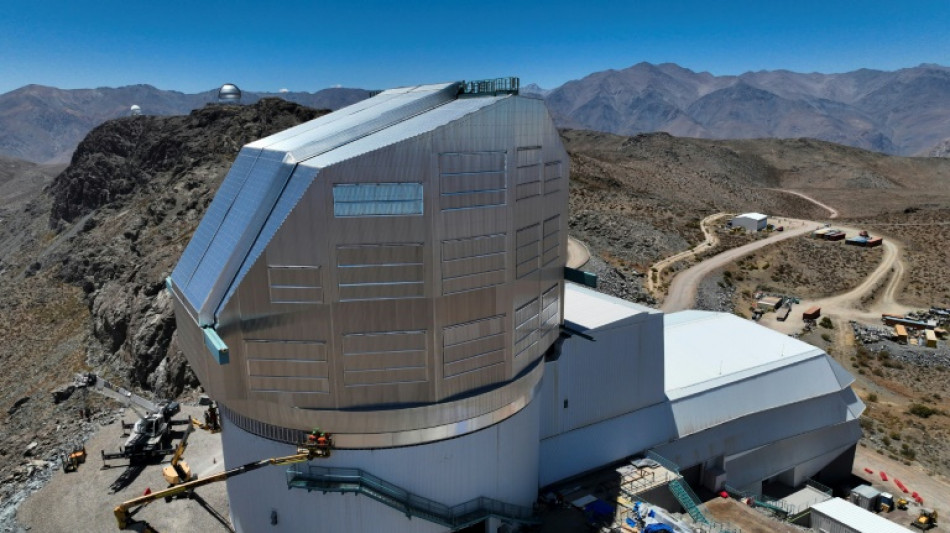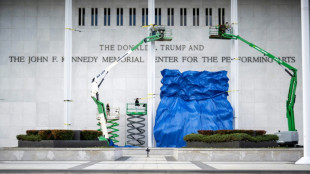
-
 England dig in as they chase a record 435 to keep Ashes alive
England dig in as they chase a record 435 to keep Ashes alive
-
Wembanyama 26-point bench cameo takes Spurs to Hawks win

-
 Hodge edges towards century as West Indies 310-4, trail by 265
Hodge edges towards century as West Indies 310-4, trail by 265
-
US Afghans in limbo after Washington soldier attack

-
 England lose Duckett in chase of record 435 to keep Ashes alive
England lose Duckett in chase of record 435 to keep Ashes alive
-
Australia all out for 349, set England 435 to win 3rd Ashes Test

-
 US strikes over 70 IS targets in Syria after attack on troops
US strikes over 70 IS targets in Syria after attack on troops
-
Australian lifeguards fall silent for Bondi Beach victims

-
 Trump's name added to Kennedy Center facade, a day after change
Trump's name added to Kennedy Center facade, a day after change
-
West Indies 206-2, trail by 369, after Duffy's double strike

-
 US strikes Islamic State group in Syria after deadly attack on troops
US strikes Islamic State group in Syria after deadly attack on troops
-
Epstein files opened: famous faces, many blacked-out pages

-
 Ravens face 'special' Patriots clash as playoffs come into focus
Ravens face 'special' Patriots clash as playoffs come into focus
-
Newly released Epstein files: what we know

-
 Musk wins US court appeal of $56 bn Tesla pay package
Musk wins US court appeal of $56 bn Tesla pay package
-
US judge voids murder conviction in Jam Master Jay killing

-
 Trump doesn't rule out war with Venezuela
Trump doesn't rule out war with Venezuela
-
Haller, Aouar out of AFCON, Zambia coach drama

-
 Nasdaq rallies again while yen falls despite BOJ rate hike
Nasdaq rallies again while yen falls despite BOJ rate hike
-
Bologna win shoot-out with Inter to reach Italian Super Cup final

-
 Brandt and Beier send Dortmund second in Bundesliga
Brandt and Beier send Dortmund second in Bundesliga
-
Trump administration begins release of Epstein files

-
 UN Security Council votes to extend DR Congo mission by one year
UN Security Council votes to extend DR Congo mission by one year
-
Family of Angels pitcher, club settle case over 2019 death

-
 US university killer's mystery motive sought after suicide
US university killer's mystery motive sought after suicide
-
Rubio says won't force deal on Ukraine as Europeans join Miami talks

-
 Burkinabe teen behind viral French 'coup' video has no regrets
Burkinabe teen behind viral French 'coup' video has no regrets
-
Brazil court rejects new Bolsonaro appeal against coup conviction

-
 Three-time Grand Slam winner Wawrinka to retire in 2026
Three-time Grand Slam winner Wawrinka to retire in 2026
-
Man Utd can fight for Premier League title in next few years: Amorim

-
 Pandya blitz powers India to T20 series win over South Africa
Pandya blitz powers India to T20 series win over South Africa
-
Misinformation complicated Brown University shooting probe: police

-
 IMF approves $206 mn aid to Sri Lanka after Cyclone Ditwah
IMF approves $206 mn aid to Sri Lanka after Cyclone Ditwah
-
Stocks advance as markets cheer weak inflation

-
 Emery says rising expectations driving red-hot Villa
Emery says rising expectations driving red-hot Villa
-
Three killed in Taipei metro attacks, suspect dead

-
 Seven Colombian soldiers killed in guerrilla attack: army
Seven Colombian soldiers killed in guerrilla attack: army
-
Amorim takes aim at Man Utd youth stars over 'entitlement'

-
 Mercosur meets in Brazil, EU eyes January 12 trade deal
Mercosur meets in Brazil, EU eyes January 12 trade deal
-
US Fed official says no urgency to cut rates, flags distorted data

-
 Rome to charge visitors for access to Trevi Fountain
Rome to charge visitors for access to Trevi Fountain
-
Spurs 'not a quick fix' for under-fire Frank

-
 Poland president accuses Ukraine of not appreciating war support
Poland president accuses Ukraine of not appreciating war support
-
Stocks advance with focus on central banks, tech

-
 Amorim unfazed by 'Free Mainoo' T-shirt ahead of Villa clash
Amorim unfazed by 'Free Mainoo' T-shirt ahead of Villa clash
-
PSG penalty hero Safonov ended Intercontinental win with broken hand

-
 French court rejects Shein suspension
French court rejects Shein suspension
-
'It's so much fun,' says Vonn as she milks her comeback

-
 Moscow intent on pressing on in Ukraine: Putin
Moscow intent on pressing on in Ukraine: Putin
-
UN declares famine over in Gaza, says 'situation remains critical'


Astronomers in Chile to scour universe with car-sized mega camera
Surrounded by the desert mountains and clear blue sky of northern Chile, astronomers from the Vera C. Rubin Observatory hope to revolutionize the study of the universe by affixing the world's largest-ever digital camera to a telescope.
The size of a small car and weighing 2.8 metric tons, the sophisticated piece of equipment will reveal views of the cosmos as never before, officials from the US-funded project told AFP.
Beginning in early 2025, when the $800 million camera will snap its first photos, the machine will sweep the sky every three days, allowing scientists to reach new heights in their galactic analyses.
Researchers will be able to go from "studying one star and knowing everything in-depth about that one star, to studying thousands of stars at a time," said Bruno Dias, president of the Chilean Society of Astronomy (Sochias).
According to Stuartt Corder, deputy director of NOIRLab, the US research center running the observatory located 2,500 meters (8,200 feet) up the Cerro Pachon mountain, 560 kilometers (350 miles) north of Santiago, the new facility will usher in "a paradigm shift in astronomy."
The project solidifies Chile's dominant position in astronomical observation, as the South American country is home to a third of the globe's most powerful telescopes, according to Sochias, and boasts among the clearest skies on the planet.
The Rubin Observatory camera's first task will be to complete a 10-year review of the sky, called the Legacy Survey of Space and Time (LSST), which researchers hope will reveal information about 20 million galaxies, 17 billion stars and six million space objects.
The survey will give scientists an up-to-date inventory of images of the solar system, allow them to map our own galaxy, the Milky Way, and delve deeper into the study of energy and dark matter.
- 300 TVs for one picture -
The new camera will be able to capture 3,200-megapixel photos -- resulting in images so large they would require more than 300 average-size high-definition televisions, lined up together, to view just one.
The machine, built in California, will have triple the capacity of the world's current most powerful camera, the 870-megapixel Hyper Suprime-Cam in Japan, and will have six times the capacity of NOIRLab's most powerful camera.
The lab's existing top camera, on Chile's Cerro Tololo mountain, is only 520 megapixels, according to Jacques Sebag, head of construction of the Rubin telescope.
Chile's telescopes have come a long way since the 40-centimeter Cerro Tololo telescope, at the country's first international observatory, installed in the 1960s.
"That telescope arrived here on the back of a mule, because there was no road," said Stephen Heathcote, director of the Cerro Tololo Inter-American Observatory, only 20 kilometers from Cerro Pachon.
- Astronomy capital of the world -
The Vera C. Rubin Observatory, named in honor of the US astronomer who discovered dark matter, will join several other space observation research centers in northern Chile.
The natural conditions of the region's desert landscape -- tucked between the Pacific Ocean and the Andes mountain range -- creates the clearest skies on the planet, thanks to a dry climate with little cloud cover.
The area plays host to telescopes from more than 30 countries, including some of the most powerful astronomical instruments in the world, such as the radio telescope at the ALMA Observatory and the under-construction Extremely Large Telescope, which by 2027 is set to be able to view never-before-seen reaches of the universe.
Many of humanity's most important astronomical discoveries have been made at the Cerro Tololo observatory, such as the 2011 Nobel Prize-winning revelation that expansion of the universe is picking up speed, a phenomenon known as cosmic acceleration.
Though other influential observatories have been opened around the globe, including in the United States, Australia, China and Spain, "Chile is unbeatable" in the world of astronomy, said Dias, the Sochias president.
S.F.Warren--AMWN


